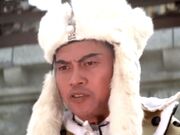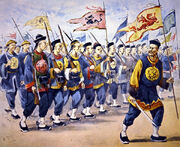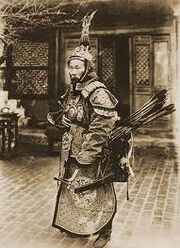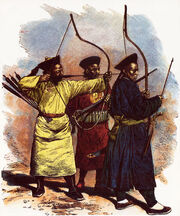Weng Wu (traditional Chinese: 鄔翁; simplified Chinese: 邬翁; Wū wēng) (born 1 December, 1858 – died 7 March, 1908) was a Chinese general, politician and Emperor of the late Qing Dynasty in China. He was the nephew of Weng Lee, the famous Emperor and general. He quickly managed to rise to power, becoming Viceroy of Liangjiang and Governor of Manchuria.
During the Great Revolution he fought with his uncle against Chan in Manchuria, Mongolia, Xinjiang and Tibet, and took the tile of Guangrong Shengli Emperor (光榮的勝利皇帝;Guāngróng de shènglì huángdì;Glorious Victorious Emperor). He was constantly defeated by Chan's army and after the fall of Lhasa, he was arrested and exiled to Hong Kong.
In 1899, amidst rebellions in South China, Wu managed to escape to China and defeat Chan's armies, but the British, under William James, defeated him in the battle of Anqing and exiled him to the British colony of St. Helena.
Early Life[]

The Forbidden City in Beijing.
Weng Wu was born in 1 December, 1858 in Dongying, Shandong. China at that time was in civil war between the Qing royalists and the Taiping rebels. Wu's father, Weng Xi was the son of Weng Yu, who was the brother of Weng Lee. Lee was a General in the army of the great military genius, Ma Xinyi. Ma was the leader of an army that in 1858 begun an epic campaign against the Taiping rebels, that would lead to their defeat in 1864 and would show to the world the military genius of Ma Xinyi. So, Weng Wu grew up hearing stories about the great campaign of General Ma and his uncle Lee. Wu himself wrote about this in his autobiography "A Chinese in St. Helena":
"I grew up with stories about the great Ma. My father told me, when I was still a young boy, stories from the war against the Taiping. My mother wanted me to hear about fairy tales, but I always preferred my father's war stories. The story I liked most to hear was the one about Ma's victory in the May Campaign. I loved this story."
After the end of the war, Lee became Commander of all Military Forces in Jiangnan and Jiangxi, but was later jailed by Ma. After Ma was assassinated, Lee was able to build up his power base and become once again Commander of all Military Forces in Jiangnan and Jiangxi. In 1876, at the age of 18, Wu joined the army. In 1877, Wu took part in a coup to oust the Viceroy of Liangjiang, Zeng Guofan.
Wu led a force of 100 men to destroy the elite Guards of Liangjiang, that were loyal to Zeng. In a surprise attack, Wu attacked their barracks and despite that the Guards were better trained and 700 men strong compared to Wu's 100 men, the attack was a success, mainly because of the surprise Wu managed to achieve. The coup was a success, and Lee became the new Viceroy of Liangjiang. In 1881, Empress Dowager Cixi died and Lee found the chance to take power from the mother of the Guangxou Emperor, Yehenara Wanzhen. Wu followed his uncle in his march on Beijing, which was taken in 21 November.
Marriage and Viceroy of Liangjiang[]

Yehenara Wanzhen.
Wu, at the age of 23, married the 33 years old Yehenara Wanzhen in 1 December 1881. Wu was deeply in love with Yehenara, but at first she disliked him. However, as time passed, Yehenara would fall in love with Wu and despite Wu's infidelity, she would love him. Yehenara would give birth to a son in 1885. Wu, despite cheating on Yehenara, would always be in love with her and did not stop sending to her love letters and poems. In 1882, Wu became Viceroy of Liangjiang. As Viceroy, he tried to modernize the industries, by introducing western technology and tried to draw European investment in the region.
Governor of Manchuria[]

Wu as Governor of Manchuria.
In April 1892, Wu was made Governor of Manchuria. As Governor of Manchuria, Wu introduced his reforms there, helping the Manchurian economy to grow. Wu also made reforms in the army. He adopted the Office of Logistics and Supplies (物流與供應辦公室;Wùliú yǔ gōngyìng bàngōngshì) of Ma Xinyi, which made sure that the army, in times of war, could be well supplied, both in food and equipment and would allow Wu, during the Great Revolution, to gather and train an army of 420,000 men. This reform had been abandoned after the death of Ma Xinyi, but Wu saw it's use. In 1893, the Great Revolution, led by Chan Le, begun against Lee. Although, at first, Lee had some success, by late August 1894, Lee's defeats in Fuzhou and Anqing made sure that he was going to lose the war.
The Great Revolution[]

Wu as Guangrong Shengli Emperor.
Since August 1894, Weng Wu was gathering and training a huge army in Manchuria. He knew that his uncle was going to be defeated, so he decided to let his uncle and Chan fight on and decimate their forces, so when Chan would win, his army would be too battered to face him. By the April of 1895, Wu had a force of 420,000 well trained men. Most of them were Manchus and Mongols. After his uncle's defeat, Wu declared himself Emperor of China and took the title of Guangrong Shengli Emperor (光榮的勝利皇帝;Guāngróng de shènglì huángdì;Glorious Victorious Emperor).
Wu also had a sexual relationship with Liao Nira, Queen of the Mongol Tribes. Although the Mongol Tribes were under Qing control, they had some autonomy and Wu promised Liao to make Mongolia an independent state. So, Wu had managed to gain the support of the Mongol tribes and was ready to face Chan.
The Manchurian Campaign[]

Qing soldier with rifle.

Battle of the Songhua River
In 13 April 1895, Chan, with an army of 350,000 men, invaded Manchuria. Instead of facing resistance, Chan had to face small garrisons of 1 to 2,000 men in the most important cities. This would continue until Chan reached the Songhua River, near the city of Jilin, in 1 May. There, Wu had gathered almost all of his forces, 400,000 men. Chan had 500 cannons, while Wu had 400 cannons. So, in the Battle of the Songhua River, the largest battle of the civil war, 750,000 men and 900 cannons would face each other. Wu had in his back the Songhua River, which made sure that he could not be outflanked, but in case he lost the battle, it would prevent a retreat and would be catastrophic.
Wu placed 200,000 men in his center, and 100,000 men in each of his two wings. Chan placed 150,000 men in his center and 100,000 soldiers in each of his two wings. Wu's plan was to have his wings to outflank and encircle the enemy army. Chan's plan was to use his 150,000 men in his center to break the Qing center, while his two wings would protect his center from being outflanked. Once the Qing center was broken, Chan would attack each enemy wing and destroy it. Both Wu and Chan placed all of their cannons at their centers.
The battle begun in 6:30 in the morning, with Chan's 500 cannons firing at the enemy center in a truly massive bombardment. Wu's 400 cannons replied to Chan's cannons and fired at the rebel center. This huge bombardment caused the death of 50,000 men in the Qing center and 40,000 men in the rebel center. In 8:00, after almost 2 hours of bombardment, Wu send his right and left wings to outflank the enemy left and right wings. In both left and right, 100,000 Qing troops would have to face 100,000 rebel soldiers. Chan ordered his 110,000 men to advance against the enemy center, which had 150,000 soldiers. The two centers fought for many hours, while the left and right wings fought viciously.
When the Qing center had broken, Chan used a small part of his army to isolate the enemy left wing, while he moved with the majority of his army first against the Qing right wing and then moved back and attacked and destroyed the Qing left wing. The defeated Qing soldiers tried to retreat, but thousands of them were drowned in the Songhua River. The battle ended with 160,000 rebel soldiers and 280,000 Qing soldiers dead, a total of 440,000 deaths. With this defeat, almost the whole of Manchuria was captured by Chan's forces. Wu managed to escape to Mongolia, but his wife was captured. Yehenara Wanzhen, as mother of Puyi, was pardoned, but she had to divorce her husband and marry Chan, which reinforced Chan's position. Wu would never see his wife and his son again. But the war was still far from over. With Wu's escape to Mongolia, Chan had to begin an invasion of Mongolia.
The Mongolian Campaign[]

Liao Nira.

The Mongol Cavalry.
Weng Wu was able to escape to Mongolia, ruled by Queen Liao, with 20,000 men. Although Liao knew that Wu would not be able to retake China, she believed that they would be able to hold on Mongolia and make it an independent state. That's why this phase of the Great Revolution is sometimes called, especially in Mongolia, the "First Mongolian War of Independence". Liao had an army of 30,000 Mongolian infantry and 50,000 cavalrymen. The Mongol cavalry was legendary for it's speed and ferocity. In total, they had an army of 100,000 men. The Mongols had also been equipped by the Russians, who did not view well Chan's rise to power, with 60 cannons.
In 30 June, Chan invaded Mongolia with 200,000 men and 200 cannons. The Mongol Army retreated further and further into Mongolia, forcing Chan to leave men behind and extend his supply lines. Chan finally caught up the Mongol army outside Urga (modern day Ulan Bator) in 15 July. The Battle of Urga was decisive, in that the backbone of the Mongol Army was crushed. Chan, using his huge superiority in numbers and cannons was able to crush his enemy. The 50,000 Mongol cavalrymen, the best cavalry in the world, were destroyed after they made a charge against their enemy, which cost them 20,000 lives. The cavalry could not win against cannons. The age when the Mongol cavalry terrorized all enemies was over. In total, the Mongols lost 40,000 men and Chan 30,000.
The Mongol Army retreated to the city of Uliastai, where 60,000 Mongol soldiers fortified. Chan besieged the city with 150,000 men and 180 cannons and the city fell in 10 August. 20,000 of Chan's men and 15,000 Mongols had died in the siege. Liao committed suicide while Wu managed to escape the city. After his victory, Chan thought that the civil war was over. But he would soon be proved wrong
The Western Campaign[]

Chan's Western Campaign.

Map showing the rivers of the Tarim Basin.

Lhasa, Tibet.
Wu was lucky to have as his friend the Governor of Xinjiang, Mehmet Ali. Mehmet, a Muslim Chinese, had stayed neutral in the civil war, taking neither side. But when his friend came to see him in 23 August, he decided to hide him. But this could not remain secret for ever, and when Chan learned about it, he demanded that Mehmet give up Wu. Mehmet refused, and so Chan gathered a force of 100,000 soldiers and 60 cannons in Uliastai. Mehmet had meanwhile gathered 140,000 men and had declared jihad against Chan.
Chan's army invaded Xinjiang in 9 September from Mongolia. The Chinese Army met the Muslim rebels in 16 September outside the city of Ürümqi. Despite that Mehmet had more soldiers than Chan, Chan was able to use his cannons to a great effect and managed to defeat Mehmet, losing only 10,000 men to Mehmet's 30,000. After the battle, Mehmet and Wu left the area with 50,000 men, while the rest 60,000 men moved inside Ürümqi and fortified. The siege would last for a month, but in 3 October, the city fell. Chan lost 6,000 men to the enemy's 8,000 men. After his victory, Chan decided to wait until reinforcements would arrive.
Meanwhile, Wu and Mehmet fortified their army behind the Tarim River. In 2 December, Chan, with 300,000 fresh men and 300 cannons, moved against the Muslim army in Tarim. His army tried to cross the river, but it failed. The enemy was too well fortified and made good use of the river. Chan would try to cross the river other nine times. The first eight crossings were catastrophic, but the ninth was a success. Chan had managed to push back the rebels, but the price was staggering. He had lost 70,000 men to the 10,000 rebels.
After their defeat, Mehmet and Wu were able to move their army fast into Tibet. Chan's army was huge and slow, so they were able to have some time to regroup their forces. Their armies invaded Tibet in 4 January 1896. The Dalai Lama tried to resist with 20,000 Tibetan soldiers outside Lhasa, but his army was crushed in the Battle of Lhasa (9 January) by the 40,000 rebels, leaving 5,000 rebel and 10,000 Tibetan soldiers dead and forcing the Dalai Lama to support the rebellion.
Chan moved against Lhasa in 15 February. He besieged it with 200,000 men and 300 cannons. Despite his numerical superiority, Chan was not able to take the city for 5 months, thanks to the brave resistance of the small rebel forces. In 16 June, Chan decided to make a final assault with his 120,000 remaining soldiers. Wu and Mehmet had only 20,000 men, who had not slept for months and were starving. The attack was a success, the city was taken and all rebel soldiers were killed. Lhasa was set on fire, but it was later rebuild by Chan. The Siege of Lhasa, the last battle of the civil war, had cost the lives of 90,000 imperial and 40,000 rebel soldiers. After this battle, Chan was the absolute ruler of the entire Qing Empire.
Exile to Hong Kong[]

Location of Hong Kong.
Wu was captured by Chan after the fall of Lhasa. While he could have killed him, Chan decided to spare Wu, but, as he did with his uncle, he exiled him. Chan made a deal with the British to allow Wu to be exiled in Hong Kong and to be guarded by British soldiers. Chan also signed a military alliance with the United Kingdom, hoping that the British would protect him from hostile Russia and France.
Wu would spend his time in Hong Kong in reading history books and writing several historical books, like the "History of Europe" in 40 volumes. But he was also informed of what was happening in China. Chan was having a lot of trouble, as he had promised to end all deals with the foreigners, but in order to end the treaties with Russia and France, he had to rely more and more in British help, which caused anger among the conservatives. Chan also had disbanded huge parts of his army. This combined with the more than 200,000 former soldiers that fought with the Lee faction but now had no job and were discriminated and a famine in Fujian, caused a revolt in Fujian in 1899.
The 60 Days War[]
In 6 April 1899, Wu managed to escape from his guards in the darkness of night, thanks to the help of five friends, and left for the port. In the port, he was hidden in a wooden box in a ship, which left for Fujian, where it arrived in 10 April. There, the 30,000 rebel peasants and soldiers, along with the population, cheered him and greeted him as a liberator from Chan, who they viewed as a tyrant and a usurper.
The rebel offensive[]

Qing soldiers.

Qing Archer.
Wu was able to organize his army into six Army Groups of 5,000 men each. Army Groups I, II and III, led by Hangzing Le, who was a commander of Lee and when the revolution started, he sided with the rebels, would march on Nanchang, while Army Groups IV, V and VI, led by Wu himself, would march to Guangzhou. When Chan learned of Wu's comeback, he declared him to be a criminal and set out to defend Nanchang with 100,000 soldiers.
Before Chan could arrive with his army, Hangzing had already taken over Nanchang by 19 April, having lost only 3,000 men to the government's 9,000 men. Chan reached the city in 25 April and besieged it, but he faced heroic resistance by Hangzing's 12,000 men, who were able to use the city's fortification to the maximum effect.
Meanwhile, Wu and his 15,000 men met an enemy force of 30,000 men outside Guangzhou in 15 April. Wu hid 7,000 of his men behind the deep vegetation. He then made an all out attack against the enemy with just 8,000 men. After a few hours of fighting, Wu ordered a retreat. As Wu's soldiers were retreating, the enemy decided to hunt him down. So, Wu was able to lure them into his trap. His 7,000 suddenly appeared, encircled and massacred the enemy. 25,000 Qing and 4,000 rebel soldiers were killed. After this victory, Wu recruit 70,000 peasants, which he trained for two weeks, and with an army of 81,000 men, he moved into the Hunan province in 8 May.
Chan, fearing that Wu could now encircle him, ended the siege of Nanchang in 12 May and retreated to Wuhan in the Hubei province. At the same time, he made a deal with the UK to send soldiers to support him. The UK, not wanting to lose China as it's ally and allow their enemies to increase their influence in China, send in 19 May an army of 40,000 soldiers and 100 cannons under General William James to destroy Wu's army.
Battle of Wuhan[]

Qing archers.

Cavalry charge during the battle of Wuhan.

Qing soldiers.
In 20 May, Hangzing's and Wu's men united and marched with a total of 100,000 men against Chan's 90,000 men. Chan decided to try and destroy Wu on the battlefield. So, he set his army outside the city of Wuhan. He had 70 cannons compared to Wu's 20 cannons, but Wu had 10,000 more men than him.
Wu place 20,000 men in his right and left wings and 60,000 men in his center. He placed his cannons in his left wing. Chan, who thought that Wu's main attack would come from the center, decided to have 70,000 of his men in the center and 10,000 in his right and left wings. Chan's plan was to break the enemy center and then defeat each enemy wing.
The battle begun in 25 May. Wu ordered his right and center to fortify and go on the defensive, while his left wing would attack the enemy left wing. Chan ordered his center to break the enemy center and his right and left wings to go on the defensive. The Qing center fought hard against the rebel center, but it was unable to defeat it. Meanwhile, after almost two hours of fighting, the rebel left wing, thanks to it's local superiority in numbers and cannons, managed to crush the Qing left wing.
At the same time, Chan bombarded with his cannons the rebel center and almost managed to break it, but when he heard that the rebel left wing had crushed his left wing, he decided to send 30,000 men from his center to protect his flanks. This allowed Wu's center to regroup. Wu ordered his right wing to attack the Qing right wing, in order to stop it from going against the rebel left wing. His right wing not only did that, but it managed to destroy the Qing right wing, forcing Chan to send 20,000 men from his center to defend his flanks.
Wu knew that this was the time to attack, and he ordered an all out attack of his center against the Qing weakened center. The attack was a huge success, and Chan's army was routed. Chan had lost 50,000 men to Wu's 20,000. Chan, already unpopular, now lost all support. It seemed that his government would collapse and the only thing standing in Wu's way was the British army of William James.
Battle of Anqing[]

William James, commander of the British forces in China.

British redcoats in Anqing.

British soldiers fire at their enemies.
In 8 June, the 80,000 men strong army of Wu would face the 40,000 British soldiers of William James in Anqing. William had 100 cannons compared to the 30 cannons Wu was able to gather. Despite his inferiority in numbers, his soldiers were better trained and equipped and had much experience in war. Williams had commanded British forces in France, Egypt, Sudan and India and is considered to be one of the greatest British generals of all time.
Wu placed 20,000 men in his right and left wings and 40,000 in his center. William placed 10,000 forces in his center, left and right wings and kept 10,000 men in reserve. The battle begun when Wu ordered his cannons to fire at the enemy center. William replied to Wu's 30 cannons with his 100 cannons, which killed more than 10,000 people in Wu's center.
Wu then ordered his right and left wings to encircle the enemy army. William responded by having his men in his right and left wings to meet the enemy wings. Despite that both British wings were outnumbered by 2 to 1 by Wu's men, the British soldiers, thanks to their excellent training and equipment, were able to not only defend their position for more than an hour, but they were also able to force the enemy wings to retreat with heavy casualties.
Wu then ordered his wings to regroup and attack again and also had his center to charge at the enemy center. Wu outnumbered the enemy center by 3 to 1, since he had 30,000 men to William's 10,000. His soldiers charged at the enemy, and despite heavy casualties, they almost managed to break William's center. Soldiers from the British center started to run for their lives and William decided that this was the time to use his reserve force. 10,000 British soldiers moved to reinforce their center.
When Wu's soldiers in the center saw this huge British force, they routed. Soon this spread to the entire army and Wu's army collapsed. Wu himself was arrested and the next day, the rebel provinces surrendered to Chan's government. The rebels had lost 30,000 men and the British 10,000.
Exile in St. Helena[]

The location of St. Helena.

Wu's house in St. Helena.
Chan decided to spare once again Wu, but this time, he had Wu exiled in the British colony of St. Helena, a small island in the South Atlantic Ocean. Wu arrived there in 3 July 1899 and would live there for the rest of his live. A small house was given to him and Wu spend most of his time riding his horse or writing his autobiography "A Chinese in St. Helena". Wu also requested many times to see his former wife, Yehenara, which was now married to Chan, and his son, but his requests were denied.
In 1905, his autobiography was printed in the UK first and then to the rest of Europe and the USA and had huge success. Wu became famous to most of the world and promoted his image as a man who wanted to modernize China and get it rid of corruption and the colonialism of the foreign powers.
In 7 March, 1908, aged 50, Wu died. He was buried in St. Helena, but he would be reburied in Beijing in 1980. His image in China was for many decades that of a corrupt man, who in order to take power, caused the deaths of millions. However, this changed after the Communists won the civil war in 1949 and Wu would be seen as a revolutionary who wanted a modernized and free China. In Mongolia, because of his support for Mongol independence, he is also seen as a hero.
Quotes[]
"I have fought many opponents, but never have I seen so few enemies to resist such a huge army, like the British in the battle of Anqing." - Wu in his autobiography "A Chinese in St. Helena".
"I have only one wish in my entire life. To see my son and my former wife again, even for a moment." - Wu in one of his letters requesting to see his former wife and his son.
